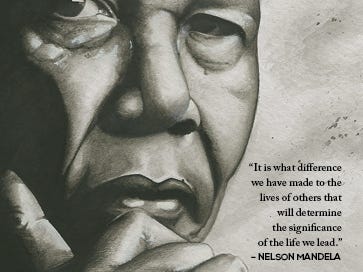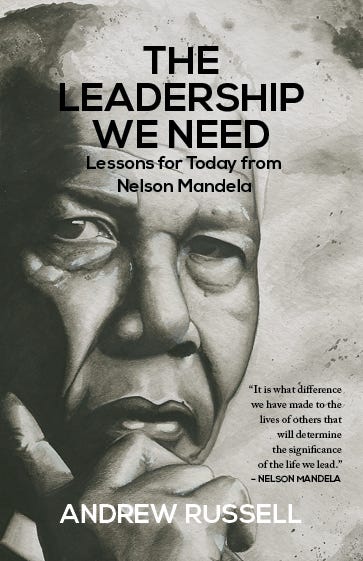Nelson Mandela’s leadership of South Africa’s peaceful transition from apartheid and authoritarian rule was virtually unprecedented and unparalleled. Now, more than ever before, we need to remind ourselves of the qualities he possessed and how we can learn from his example and become better people and leaders ourselves.
I’m immensely proud to be publishing Andrew Russell’s powerful and timely new book The Leadership We Need: Lessons for Today from Nelson Mandela. Andrew is a white South African who was born in 1964, the very year Mandela was imprisoned on Robben Island. Below is an excerpt from the book’s Foreword.
- Ethan Casey, Publisher, Blue Ear Books
Available 1 December 2023. Pre-purchase The Leadership We Need for US$16.95 plus $3.95 US shipping. Or use this QR code:
Countless books have been written covering all aspects of Nelson Mandela’s character, life, and legacy. I never had the privilege of meeting him, although on two occasions I was in a rugby stadium when he was present. His mere presence was inspiring; just being in those venues and seeing him in the flesh was something I will never forget. If that was the impact he had on me from a distance, I can only imagine the meaningful influence he had on those he was in regular contact with.
One of those is Christo Brand, who was Mandela’s prison guard on Robben Island and later at Pollsmoor Prison and became his lifelong friend – a story he tells in his memoir Doing Life with Mandela: My Prisoner, My Friend, the updated 2022 edition of which I edited, published by Blue Ear Books. I first met Christo in 2017, when he was considering leaving his position as a supervisor in the Robben Island tourist shop so he could pursue his dream of sharing the story of his journey with Nelson Mandela on a full-time basis. Over the ensuing years, in my role as Christo’s business manager, I have come to understand what a vital role these two men played in each other’s life and, indeed, in the course of South Africa’s history.
I am neither a politician nor a historian. I am an ordinary white South African who lived through the most tumultuous period of our history, a period in which the oppressive system of apartheid was dismantled and our country enjoyed its first-ever democratic elections, in which every adult, regardless of race, could take part in choosing the path for the new South Africa.
During our virtual sessions with overseas school and university groups, youngsters often ask Christo and me questions such as: ‘How would Mandela have handled the George Floyd murder?’ And often I find attendees commenting that what the world needs right now is a leader like Nelson Mandela. This has reinforced my belief that in times of global strife and uncertainty, we need leaders to stand up and be counted. We need role models we can turn to for inspiration, guidance, and leadership. We need, now more than ever, to take stock and to push the default setting button. The default setting for global leadership in modern times is Nelson Mandela. He exemplifies the leadership we need.
Mandela was a unique leader in many ways: the simple rural boy who selflessly endured what he did in life to become, in the end, a reluctant president. In the book Conversations with Myself, he said, ‘My installation as the first democratically elected President of the Republic of South Africa was imposed on me much against my own advice.’ Mandela accepted the position only after the senior leaders of the African National Congress put pressure on him. His was a life of selfless sacrifice and struggle, all with one goal in mind: a free and democratic South Africa for all. To accomplish this goal, he was prepared to spend twenty-seven and a half years in prison.
Now, more than ever before, we need to turn to him. We need to remind ourselves of what he endured, what qualities he possessed, and how we can learn from his example and become better people and leaders ourselves. When faced with a personal challenge, I often wonder: ‘What would Mandela have done?’ This is a book full of hope, a place for all of us to draw strength from the life of Nelson Mandela, the rural Eastern Cape boy who became president of a democratic country. It is a book for people of all ages, learners and educators, leaders and followers.
*
I was born in Cape Town in 1964 and grew up as a white South African under the apartheid regime. Apartheid had been introduced and perpetrated by the National Party following the whites-only election of 1948, in order to control and restrict the movement of black people. Racial segregation and white supremacy had become central aspects of South African policy long before apartheid began. The controversial 1913 Land Act, passed three years after South Africa gained its independence, marked the beginning of territorial segregation by forcing black Africans to live in reserves and making it illegal for them to work as sharecroppers. Opponents of the Land Act formed the South African National Native Congress, which would become the African National Congress (ANC).
Under apartheid, nonwhite South Africans – the large majority of the population – were forced to live in separate areas from whites and use separate, far inferior public facilities. Contact between racial groups would be limited. Despite strong and consistent opposition to apartheid both within and outside of South Africa, its laws remained in effect for the better part of half a century. In 1991, the government of President F.W. de Klerk began to repeal most of the legislation that provided the basis for apartheid. De Klerk and Nelson Mandela were jointly awarded the 1993 Nobel Peace Prize for their work creating a new constitution for South Africa.
*
I spent my Covid lockdown in the South African seaside village of Hermanus, reading as many books and articles on Nelson Mandela as I could lay my hands on, as I started to realise my dream of writing a book on the man I regard as the greatest leader the world has ever known. I wondered how he had coped with his own lockdown, which lasted twenty-seven and a half interminable years.
As I read more and more widely in the vast literature on Mandela, I discovered a number of recurring themes. I began asking myself questions and searching for answers. I came to realise how important Mandela’s carefree early years growing up in a rural area had been in shaping his character, and how important education had been to him. This theme of education was to remain ever-present throughout his long life, and in many ways it defined his lifelong strategy towards ensuring a free and democratic South Africa for all its people. What was that strategy? How had this man managed to dismantle apartheid and lead his country to its first democratic election, then reestablish his country on the world stage, dealing all the while with his own intensely personal challenges?
On Robben Island, the place where Mandela often found solace and peace was his garden, his escape from the harsh reality of the bleak and remote prison. I realised that he truly had been the gardener who prepared the soil for the new South Africa. I also started to ask myself if Mandela truly had forgiven those who sent him to prison for twenty-seven and a half years, the architects of apartheid, the people who carried out such vicious atrocities against his people. And, if he had managed to forgive them, how incredibly challenging must it have been for him to do so? I am not sure I would have been able to, had I been in his shoes.
I also started to ponder the question that some young South Africans are asking today: Was Mandela a sellout? Did he open the doors to the corruption within the ANC that was to follow his presidency?
Above all else, I tried to understand and appreciate what type of leader Mandela had been, and just how, beyond liberating his own country, he had succeeded in inspiring billions of people across the globe. How was it possible that, on his death, there would be such an immense outpouring of grief from citizens in all corners of the world, most of whom had never even visited South Africa, much less met the man, yet had been indelibly touched by the life he lived and the example he set for every one of us?
More recently, I have come to appreciate what lessons we all can take from Nelson Mandela’s remarkable friendship with his prison guard, Christo Brand. These two men, so utterly dissimilar in most obvious ways, had forged a close and lasting relationship, against all odds, under the harshest of conditions. And I realised that if these two men could establish such a close and lasting friendship based on mutual trust and respect, then surely it is possible for us all to learn from their example and break down the barriers of hatred and division that exist all over our embattled world.
- Andrew Russell, author of The Leadership We Need: Lessons for Today from Nelson Mandela
Available 1 December 2023. Pre-purchase The Leadership We Need for US$16.95 plus $3.95 US shipping. Or use this QR code:








